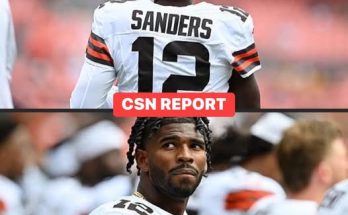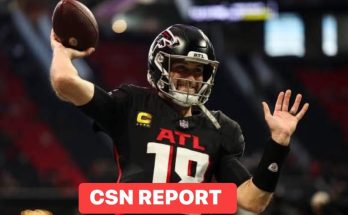According to multiple reports emerging from training camp, the Cleveland Browns have made an eyebrow-raising decision that has left fans and analysts questioning their strategy at quarterback development. Fifth-round pick Shedeur Sanders, son of NFL Hall of Famer and current Colorado head coach Deion Sanders, has apparently not been given a single practice rep so far, not even with the scout team. Instead, those opportunities have gone to Bailey Zappe, the former New England Patriots signal-caller who was brought in as a backup option earlier in the offseason. On a recent broadcast, Tony Rizzo summed up the puzzling nature of the situation with a blunt question: “Shedeur’s not even getting scout team reps. Bailey Zappe is taking those. What’s the point of him being here?”
This report is particularly striking given the investment the Browns made in Sanders during the 2025 NFL Draft. A fifth-round pick is by no means a guaranteed star, but it is a significant enough selection that teams usually make a point of evaluating the player in live practice situations. Young quarterbacks drafted in the middle rounds often serve as developmental projects, slowly learning the complexities of NFL offenses and adapting to the speed of professional defenses. Even if a rookie quarterback is not expected to see the field during the season, most organizations prefer to at least place him in scout-team situations where he can throw against the first-team defense, mimic the playing style of upcoming opponents, and get used to the rhythm of NFL practices. To completely deny a rookie quarterback any practice reps at all raises serious questions about the team’s long-term intentions.
For Shedeur Sanders, the lack of reps is even more surprising given his pedigree and the hype surrounding him during his college career. Sanders showed flashes of NFL-caliber talent at Colorado under his father’s leadership. While the Buffaloes struggled overall in the 2023 and 2024 seasons, Shedeur was consistently one of the brighter spots on the roster. His poise, accuracy, and ability to extend plays with his mobility made him an intriguing prospect. Scouts noted that he had the mechanics, football IQ, and competitive drive to potentially develop into a starter if given time and proper coaching. His draft stock took a hit due to questions about durability and how much of his college production would translate against NFL-level defenses, but to land him in the fifth round was widely considered solid value for Cleveland. For such a prospect to be left standing on the sidelines while another quarterback takes all the backup and scout-team snaps feels counterproductive to the development process.
The decision also puts a spotlight on the Browns’ current quarterback room and overall offensive strategy. Deshaun Watson remains entrenched as the starter despite an up-and-down tenure since his arrival in Cleveland. Watson’s massive fully guaranteed contract essentially ensures he will stay in that role for the foreseeable future, regardless of performance fluctuations. Behind him, the Browns have opted for veterans and journeymen as insurance policies. Bailey Zappe, who had moments of competence in New England but never truly solidified himself as a starter, represents a low-risk backup who can at least manage an offense in case Watson goes down with injury. For a coaching staff and front office under pressure to deliver playoff success, it is understandable that they would lean toward experience in the backup role rather than rolling the dice on a rookie.
Still, the Browns’ choice to effectively redshirt Sanders without giving him even practice reps undermines the basic logic of drafting him. Rookies develop through repetition, through mistakes, and through exposure to the speed of the game. By denying Sanders those reps, the Browns risk stunting his growth entirely. It is one thing to keep him inactive on game days or to leave him low on the depth chart. It is another to prevent him from even simulating an opposing quarterback’s role in practice. Scout-team work may not be glamorous, but it is often where young quarterbacks learn how to process defensive schemes and adjust timing against professional athletes. For Sanders, missing out on that means missing out on the chance to grow within the NFL environment.
The broader implications of this decision have not gone unnoticed by analysts. Some see it as an early sign that the Browns are not serious about developing Sanders at all, that he was perhaps drafted as more of a publicity pick given his name recognition rather than as a genuine part of the team’s future plans. Deion Sanders’ influence on the sport is massive, and the idea of having his son in the league certainly generates headlines. But if the Browns were not prepared to invest time and resources in developing Shedeur, then using a fifth-round pick on him could be viewed as a waste of draft capital that might have been better spent on a player at a position of need.
There is also the possibility that the Browns’ coaching staff simply does not trust Sanders’ readiness at this stage. NFL practices are tightly scripted with limited reps to go around, and coaches often prioritize players they believe are closest to contributing in actual games. If Sanders is struggling with playbook comprehension, timing, or mechanics in informal settings, the staff may have decided he is not yet ready for even scout-team duties. Still, many fans argue that the only way to accelerate readiness is through reps, so withholding those entirely seems counterintuitive.
The situation is further complicated by the dynamic with Bailey Zappe. As a young quarterback himself, Zappe is not exactly a seasoned veteran with years of experience. He has only a handful of NFL starts under his belt, and while he showed composure in moments with the Patriots, he is still largely unproven. By giving all scout-team reps to Zappe, the Browns are effectively choosing to invest developmental time in a quarterback who, in the eyes of most scouts, has a limited ceiling. Zappe’s style is more game-manager than franchise cornerstone, whereas Sanders at least carries the allure of untapped potential. The question becomes whether the Browns are sacrificing long-term upside for short-term stability in practice efficiency.
From Sanders’ perspective, the lack of reps could quickly become a source of frustration. Rookies already face enormous adjustments transitioning to the NFL, from the complexity of playbooks to the pace of practices and the physical toll of facing bigger, faster defenders. Being sidelined during these critical early months denies him the chance to prove himself and establish credibility among teammates. Quarterbacks often build relationships with receivers during scout-team drills, finding timing and trust that eventually translate to live action. Without those opportunities, Sanders risks becoming an afterthought in the locker room. His confidence, which has always been one of his strongest assets, could also take a hit if he feels marginalized by the coaching staff.
For the Browns, the optics are concerning. Fans want to believe their team is building not just for today but also for tomorrow. Drafting a quarterback brings excitement about potential, the hope that maybe, just maybe, this player could be molded into the next star. By not even giving Sanders a chance to practice, the team sends a message that development is not a priority. That could alienate portions of the fan base who were eager to see what Sanders might become. It also risks reinforcing a perception that the Browns have struggled for decades to manage the quarterback position effectively, cycling through dozens of passers without finding long-term stability.
The handling of Shedeur Sanders will likely remain a storyline throughout the season, particularly if the Browns’ offense sputters or if Watson faces injury. In those scenarios, the absence of a developed backup option could become glaring. Teams that successfully manage their quarterback rooms often groom late-round picks behind the scenes, allowing them to be ready when opportunity strikes. The San Francisco 49ers famously turned a last pick in the draft into Brock Purdy, a capable starter, precisely because they allowed him to grow in practice situations. The Browns risk missing out on similar upside by keeping Sanders sidelined.
Ultimately, the key question is whether this strategy reflects a short-term calculation or a long-term philosophy. If the Browns truly see Sanders as a long-term project, they may believe that sitting him for a year without practice reps is part of an extended developmental plan. Perhaps they want him to focus solely on classroom work, film study, and mental reps before ever stepping on the practice field. If that is the case, the decision might make sense within the walls of the facility, though it will be difficult to explain to fans and media outside of it. On the other hand, if this approach reflects a lack of confidence in Sanders’ abilities, then the Browns’ drafting of him becomes harder to justify.
In the end, the NFL is a league of opportunities, and denying a rookie quarterback the chance to even take practice snaps is an unusual and potentially damaging move. Shedeur Sanders’ story is still in its early chapters, and there is always the chance that the Browns will change course and begin incorporating him more into practices as the season progresses. But for now, the reports suggest a player with intriguing talent is standing idle on the sideline while others get the reps he desperately needs. As Tony Rizzo asked, “What’s the point of him being here?” Until the Browns provide an answer through their actions, the question will continue to hang over both the team and its young quarterback.



